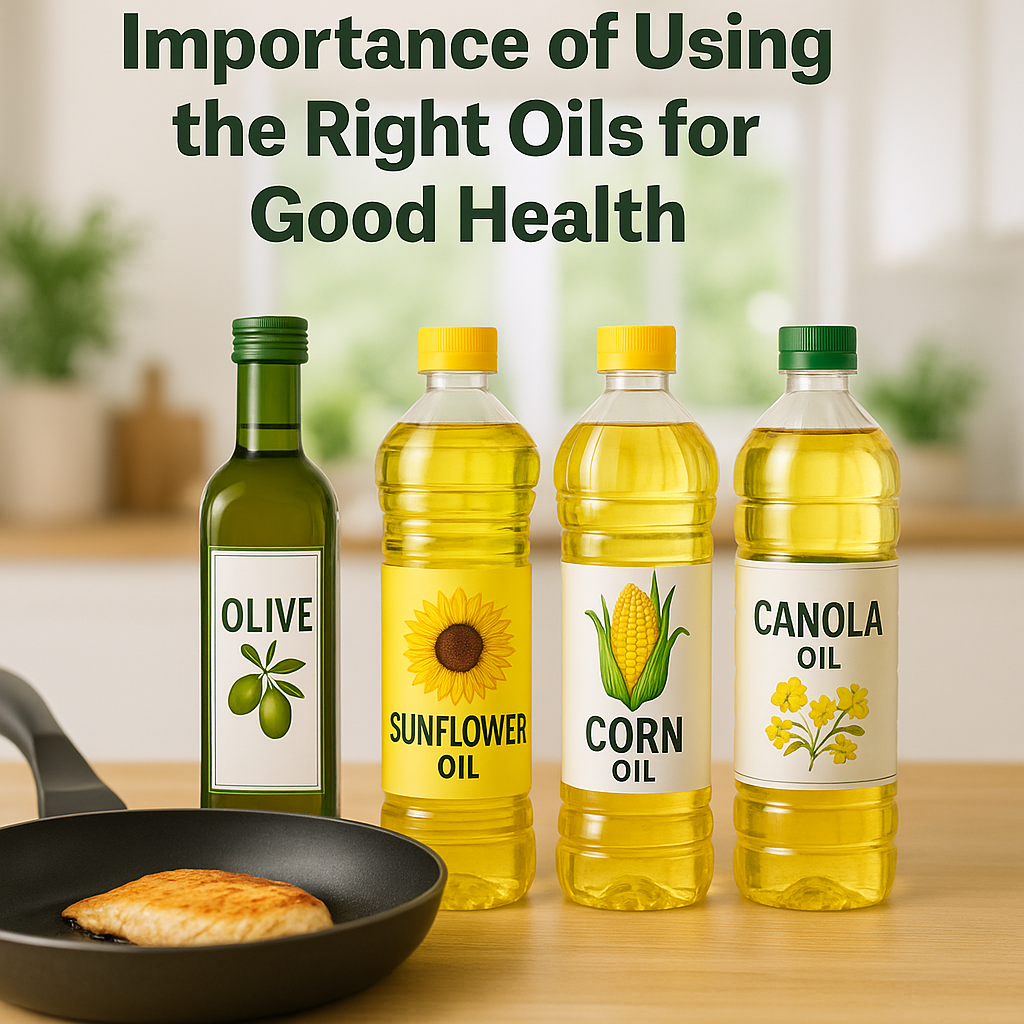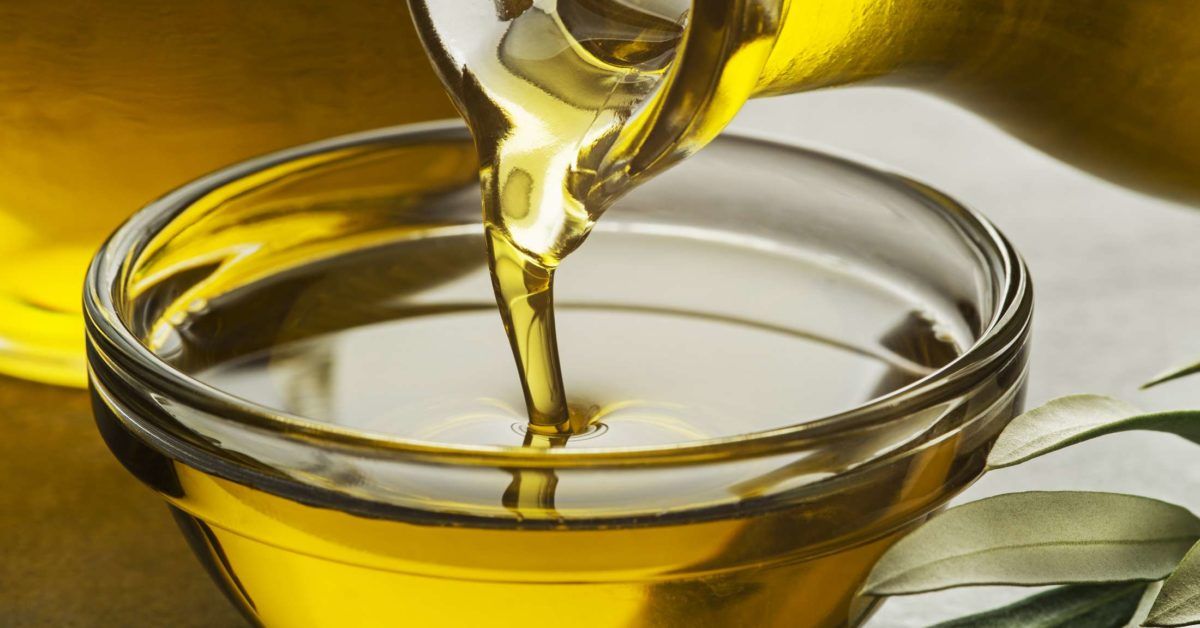Welcome to Your Essential Guide: Choosing the Right Oils for Optimal Health
Are you overwhelmed by the myriad of cooking oils available in today's market? Look no further! Our comprehensive resource, *The Essential Guide: Choosing the Right Oils for Optimal Health*, is here to help you navigate through the complexities of oil selection.
Cooking Oils Demystified: How to Make the Healthiest Choice
In this guide, we break down the essential aspects of cooking oils, helping you understand the nuances between various types. With our insights, you will learn how to make informed choices that promote a healthier lifestyle.
Healthy Fats Matter: Understanding the Role of Oils in Your Diet
Oils are not just about flavor; they play a crucial role in your overall health. Discover how healthy fats can enhance your diet and support your well-being, allowing you to enjoy delightful meals while nourishing your body.
Oil Up for Health: Why Your Choice of Oil Can Make or Break Your Meal
The right choice of oil can elevate your cooking and nutritional intake. Learn about the significant impact that oil selection has on your meals and how simple changes can lead to better health outcomes.
Omega-3 vs. Omega-6: The Importance of Balancing Your Oil Intake
Understanding the balance between Omega-3 and Omega-6 fatty acids is key to a nutritious diet. Our guide dives deep into the importance of this balance and offers tips on incorporating the right oils into your meals.
The Top 5 Cooking Oils You Should Use for Better Health
From extra virgin olive oil to avocado oil, we present the top five cooking oils that can transform your health. Each oil comes with its unique properties and benefits, enhancing both your meals and your overall well-being.
Beyond Flavor: How the Right Oils Can Boost Your Nutritional Intake
Explore how choosing high-quality oils can significantly improve your nutritional intake. The right oils offer antioxidants and essential fatty acids that contribute to a healthier lifestyle.
Oil and Your Well-Being: The Surprising Health Benefits of Quality Oils
Not all oils are created equal. Learn about the surprising health benefits that come from incorporating quality oils into your diet, including improved heart health and reduced inflammation.
From Olive to Avocado: The Best Oils for Heart Health and Beyond
Discover the best oils that promote heart health and their additional benefits. Our guide highlights oils like olive oil and avocado oil, showcasing their roles in a heart-friendly diet.
Unpacking the Benefits of Plant-Based Oils for a Healthier You
Explore the advantages of incorporating plant-based oils into your meals. With options like flaxseed and hemp oil, you can boost your nutritional profile while enjoying delicious dishes.
Join us on this culinary journey to explore oils that not only enhance flavor but also contribute to a healthier you. Welcome to your one-stop resource for all things cooking oils!

🫒 Healthy Oils: The Key to Good Health and an Active Life
In the modern health-conscious world, healthy oils play a crucial role in building a balanced diet and sustaining long-term wellness 🥗💚. These oils aren’t just about adding flavor — they’re essential for supporting heart function, brain activity, immunity, and energy ⚡. Choosing the right oils means choosing a vibrant, active lifestyle 🏃♀️🧠.
🌿 Benefits of Natural Oils: Nourish Your Body from Within
Natural oils like olive oil, coconut oil, and avocado oil offer:
- Healthy unsaturated fats for the heart ❤️
- Antioxidants that fight inflammation 🛡️
- Fat-soluble vitamins like A, D, E, and K 🧴
These oils fuel your body from within, helping you feel energized and balanced every day ✨.
🍽️ How to Choose the Right Oils for Your Daily Meals
When picking cooking oils, consider:
- Smoke point – high for frying, low for dressing 🔥
- Nutritional profile 🌾
- Cooking method – grilling, baking, or salads
Use extra virgin olive oil for cold dishes and avocado oil for high-heat cooking 🥑🍳.
🧬 Healthy Oils: The Secret to a Long and Good Life
Studies show that people on diets rich in healthy fats — like the Mediterranean diet — live longer and enjoy better quality of life 🧓🧘♀️. The secret is replacing harmful oils with nutrient-dense options 🌟.
🩺 The Role of Healthy Oils in Enhancing Body Functions
Healthy oils:
- Regulate hormones 🔄
- Aid in absorbing key nutrients 🥦
- Support nervous system health 🧠
Without these fats, your body can't perform at its best ⚙️.
❤️ Best Oils for Heart and Artery Health
Oils high in monounsaturated and polyunsaturated fats, such as:
- Olive oil 🫒
- Flaxseed oil 🌾
- Chia seed oil 🌱
They help lower bad cholesterol and raise good cholesterol, improving heart health 💓.
🛡️ How Healthy Oils Strengthen the Immune System
Oils rich in Omega-3 like fish oil and flaxseed oil:
- Reduce chronic inflammation 🧯
- Boost immune defense against infections 🦠
Make them part of your daily nutrition plan 🌿🧠.
🏋️♂️ Selected Oils: Fuel for Physical Fitness
Healthy oils aid athletic performance by:
- Supporting muscle growth 💪
- Enhancing endurance 🏃
- Providing sustained energy 🔋
Coconut oil is a fast-acting energy source — great for workouts 🥥🔥.
🧘♀️ Oils That Boost Mental Clarity and Brain Health
Fats are brain food. Omega-rich oils:
- Improve memory and concentration 🎯
- Reduce anxiety and depression 😌
- Support long-term brain health 🧠
Try adding walnut oil or flaxseed oil to your smoothies or salads.
🌍 Sustainable Healthy Oils: Good for You and the Planet
Choosing eco-friendly oils like cold-pressed coconut oil or organic canola oil ensures:
- Better personal health 🌱
- Reduced environmental footprint 🌎
Healthy for you, healthy for the earth 🌿💧.
📘 Why Choosing the Right Oil Matters: Your Guide to Better Health
All fats are not created equal. Swapping processed oils with natural ones can:
- Lower disease risk 🚫
- Improve energy levels 🔋
- Promote overall vitality 🌞
Make the switch, and your body will thank you!
🥗 Natural Oils: How They Impact Your Health Positively
Benefits include:
- Better digestion 🌿
- Improved nutrient absorption 🥕
- Glowing skin 🌟
Healthy oils make your meals delicious and beneficial.
🔍 Healthy Oils: A Complete Guide to Their Benefits and Top Types
Must-have healthy oils:
- Extra virgin olive oil 🫒
- Coconut oil 🥥
- Avocado oil 🥑
- Flaxseed oil 🌾
- Fish oil 🐟
Each has unique perks and culinary uses.
🧡 Enjoy the Benefits: Natural Oils in Daily Nutrition
Easy ways to incorporate oils:
- Drizzle on salads 🥗
- Stir into soups 🍲
- Mix into smoothies 🥤
Your health starts with small, flavorful habits 🍃.
🔑 Healthy Oils: Your Key to Wellness and Balance
Use in moderation to:
- Boost energy 🔋
- Strengthen immunity 🛡️
- Support mood and metabolism ⚖️
Balanced fats = a balanced life.
⚖️ Dark vs. Light Oils: Which Is Better for Health?
- Dark oils (like sesame oil): more flavor and antioxidants 🌑
- Light oils (like sunflower oil): better for high-heat cooking ☀️
Choose based on your recipe and health needs.
🫙 Natural Oils: Benefits and How to Add Them to Your Diet
Incorporate oils by:
- Using them in homemade dressings 🍶
- Cooking low and slow 🧑🍳
- Finishing dishes for extra richness 🍽️
They’re versatile and health-enhancing 🌿.
📋 Healthy Oil Guide: What to Choose for Better Health
Start with one oil, learn its uses, and build a rotation:
- Olive oil for heart health ❤️
- Coconut oil for energy 🔥
- Flaxseed oil for brain and immune support 🧠🛡️
💡 Eating Healthy Oils: A Natural Way to Boost Wellness
You don’t always need supplements. The right oils:
- Are nutrient-rich 🌾
- Easy to use 🍽️
- Delicious 😋
A natural, delicious way to feel better every day.
🧴 Healthy Oils and Their Secrets: Surprising Health Benefits
Daily use of natural oils helps:
- Sleep quality 😴
- Skin glow ✨
- Hair growth 💇♀️
Small steps = big health wins 🌟🫒.
Cooking Oils Demystified: How to Make the Healthiest Choice
Various Types of Cooking Oils
When it comes to cooking oils, the marketplace offers an array of options, each with its unique flavor and health benefits. Here are some popular cooking oils to consider adding to your pantry:
- Olive Oil: Renowned for its versatility, olive oil is rich in monounsaturated fats and antioxidants, making it a staple in Mediterranean diets.
- Coconut Oil: This oil has gained popularity for its medium-chain triglycerides (MCTs) that may provide quick energy and are easier to digest.
- Avocado Oil: High in monounsaturated fats and vitamin E, avocado oil boasts a high smoke point, making it ideal for frying and roasting.
- Canola Oil: Known for its neutral flavor, canola oil is low in saturated fat and high in omega-3 fatty acids.
- Flaxseed Oil: Packed with omega-3 fatty acids, this oil is best used cold in dressings to retain its nutrients.
Factors to Consider When Choosing Cooking Oils
Selecting the right cooking oil isn't just about flavor; several factors come into play. Consider these:
- Smoke Point: Choose oils with high smoke points for high-temperature cooking. Olive oil, for instance, is suitable for sautéing, while flaxseed oil is better for dressing salads.
- Fat Composition: Prioritize healthy fats. Oils rich in omega-3s, like flaxseed oil, support heart health.
- Flavor Profile: Think about how the oil will complement your dish. Strong oils like sesame oil can enhance Asian cuisine, while olive oil is perfect for pastas and salads.
By understanding the diverse cooking oils available and the factors affecting their selection, you can make informed decisions and create healthier meals for yourself and your loved ones.
Healthy Fats Matter: Understanding the Role of Oils in Your Diet
Differentiating Between Good and Bad Fats
When navigating the world of dietary oils, it’s crucial to distinguish between good and bad fats. Not all fats are created equal, and your cooking oil choice can greatly affect your health. Good Fats:
- Monounsaturated Fats: Found in olive, avocado, and canola oil, these fats are heart-healthy and can help reduce bad cholesterol levels.
- Polyunsaturated Fats: Omega-3 and omega-6 fatty acids are essential fats found in oils like flaxseed and sunflower oil. They support brain function and overall health.
Bad Fats:
- Trans Fats: Often found in partially hydrogenated oils, these fats raise bad cholesterol levels and lower good cholesterol, posing serious health risks.
- Saturated Fats: While not all saturated fats are harmful, oils high in them, such as palm oil, should be consumed in moderation.
Keeping a balance in your fat intake is essential, as the wrong oils can lead to increased health risks.
Impact of Oils on Heart Health
Now, let's talk heart health. The oils you choose to cook with can significantly influence your cardiovascular status. Studies show:
- Heart-Healthy Oils: Such as olive oil, can improve heart health by lowering bad cholesterol and increasing good cholesterol levels, thanks to their high levels of monounsaturated fats.
- Oils to Avoid: Cooking with oils that are high in trans fats can contribute to heart disease over time.
For instance, when I switched to using olive oil instead of butter for my sautés, not only did I notice a flavor boost, but I also felt more energized! By making smart choices about the oils in your diet, you’re not just enhancing the taste of your meals; you’re also taking significant steps towards a healthier heart.
Oil Up for Health: Why Your Choice of Oil Can Make or Break Your Meal
Influence of Oil Selection on Flavor
Choosing the right cooking oil is not just a matter of health; it can dramatically affect the flavor of your dishes. Each oil has its own unique taste profile, which can enhance or overpower the ingredients in your meal. For instance, a robust extra virgin olive oil adds a distinct peppery note to salads and Mediterranean dishes, while a light canola oil allows other flavors to shine through without competing. Here are a few oils and their flavor profiles:
- Sesame Oil: Offers a nutty, aromatic flavor perfect for stir-fries and Asian cuisine.
- Coconut Oil: Imparts a mild sweetness, ideal for baking and tropical dishes.
- Avocado Oil: Has a buttery flavor, enhancing both chilled and cooked preparations.
When I switched to avocado oil for my roasted vegetables, the rich, buttery taste took my dishes to a whole new level!
Health Implications of Cooking with the Wrong Oil
Using the wrong oil can lead not only to awkward flavor combinations but also to serious health concerns. Oils that are unsuitable for high heat can break down and release harmful compounds.
- Trans Fats: Cooking with oils high in trans fats, such as some margarine brands, can increase your risk of heart disease.
- High Smoke Point: Oils with low smoke points (like flaxseed oil) can become toxic when heated and should be reserved for salad dressings or dips.
Making a conscientious decision about the oil you use can enhance your cooking experience while also safeguarding your well-being. Balancing flavor with health is the key to mastering your kitchen!
Omega-3 vs. Omega-6: The Importance of Balancing Your Oil Intake
Role of Omega-3 in the Body
When discussing healthy fats, omega-3 fatty acids often steal the spotlight—and for a good reason! These essential fats play a significant role in maintaining overall health. Here’s why omega-3s are vital:
- Heart Health: Omega-3s have been shown to reduce triglycerides, lower blood pressure, and even decrease the risk of heart disease. Incorporating oils like flaxseed and fish oil into your diet can help promote a healthy heart.
- Brain Function: These fats are key players in cognitive functions. They support brain health and may reduce the risk of neurodegenerative diseases.
- Anti-Inflammatory Effects: Omega-3s can help combat inflammation, which is linked to various chronic health conditions, including arthritis and heart disease.
I remember when I started adding chia seeds (a great source of omega-3s) to my smoothies. The boost in energy and mental clarity has been remarkable!
Understanding Omega-6 to Omega-3 Ratio
While omega-6 fatty acids also play essential roles in the body—like supporting skin health and metabolism—most diets today are significantly higher in omega-6 due to the prevalence of processed oils.Ideally, a balanced ratio of omega-6 to omega-3 should be around 4:1. However, many of us are consuming ratios as high as 20:1 or even 30:1. This imbalance can lead to increased inflammation and health issues.To achieve better balance:
- Incorporate more omega-3-rich oils like flaxseed and walnut oil.
- Be mindful of omega-6 sources, primarily found in many vegetable oils like corn and soybean oil.
By consciously balancing your oil intake, you can foster a healthier body and promote overall well-being. Taking charge of your omega ratios is a small step that can make a big difference!
The Top 5 Cooking Oils You Should Use for Better Health
Characteristics of Olive Oil
Olive oil is often hailed as a super oil, and it's not hard to see why. Its rich flavor and robust nutritional profile make it a favorite in kitchens worldwide. Here are some standout characteristics:
- Heart-Healthy Fats: Olive oil is primarily composed of monounsaturated fats, which are known to help lower bad cholesterol levels. This can significantly boost heart health.
- Antioxidants: It's packed with antioxidants and anti-inflammatory properties that protect your body from free radical damage.
- Versatility: Whether drizzled over a salad, used in marinades, or as a finishing touch on roasted veggies, olive oil enhances flavor without overpowering it.
Personally, once I switched to using olive oil for my salad dressings, I noticed not just a flavor improvement, but also how much lighter I felt after meals!
Benefits of Coconut Oil
Coconut oil has taken the health world by storm, and for good reason. This tropical delight offers a host of benefits that could transform your cooking:
- Unique Fatty Acids: Rich in medium-chain triglycerides (MCTs), coconut oil can provide quick energy and may even help with weight management.
- Antimicrobial Properties: The lauric acid found in coconut oil has natural antimicrobial effects, making it a great addition to a healthy diet.
- High Smoke Point: With a high smoke point of around 350°F, coconut oil is excellent for frying and baking, allowing for versatility in cooking.
Since I began incorporating coconut oil into my baking, I’ve enjoyed not just the flavor but also the added health benefits, noticing a delightful texture in my homemade treats.Incorporating these oils into your diet isn't just about health; it can also elevate your culinary experiences!
Beyond Flavor: How the Right Oils Can Boost Your Nutritional Intake
Enhancing Nutrient Absorption with Oils
Did you know that the oils you use in your cooking can significantly enhance nutrient absorption? This is particularly true for fat-soluble vitamins like A, D, E, and K. When combined with healthy fats from oils, these nutrients become more bioavailable, meaning your body can absorb them more effectively. Here's how it works:
- Fat-Soluble Vitamins: These vitamins need fat to be absorbed. For instance, adding a drizzle of olive oil to your leafy salad not only adds flavor but helps your body absorb more vitamins A and E from the greens.
- Antioxidants: Certain oils, like olive oil and avocado oil, are rich in antioxidants, which help protect your body from oxidative stress while also aiding nutrient absorption.
I remember the first time I added a spoonful of flaxseed oil to my morning smoothie. Not only did it give my drink a nutty flavor, but I also felt more energized throughout the day, likely due to better nutrient uptake!
Incorporating Oils into a Balanced Diet
Incorporating healthy oils into your meals is simple and adds immense nutritional benefits. Here’s how to make it work:
- Cooking Methods: Use oils wisely when cooking—opt for methods like sautéing or roasting with olive or avocado oil, both of which offer beneficial fats.
- Dressing and Drizzling: Make your own salad dressings with oils like balsamic vinegar and olive oil for added nutrients along with flavor.
- Use Sparingly: Remember that while healthy oils are beneficial, moderation is key. Aim for about two tablespoons a day to keep your calorie intake balanced.
By making intentional choices about how you incorporate oils into your meals, you can elevate not only the taste but also the nutritional value of your diet. Start exploring and enjoy the flavors and health benefits!
Oil and Your Well-Being: The Surprising Health Benefits of Quality Oils
Antioxidant Properties of Certain Oils
When it comes to health, not all oils are created equal. Many high-quality oils are brimming with antioxidants, substances that protect your body from oxidative stress caused by free radicals. These antioxidants can contribute significantly to your overall well-being. Here’s why they matter:
- Olive Oil: Extra virgin olive oil is particularly rich in antioxidants such as oleocanthal, which may have anti-inflammatory properties similar to those of ibuprofen.
- Avocado Oil: Known for its high levels of vitamin E, avocado oil helps neutralize free radicals, providing not only health benefits but also enhancing skin elasticity.
I remember when I switched to using extra virgin olive oil in my cooking; I felt an improvement in my energy levels and noticed my skin looking more radiant—likely due to those powerful antioxidants!
Oil's Effect on Skin and Hair Health
It's not just your internal health that benefits from quality oils; they can work wonders on your skin and hair, too. Here’s how:
- Moisturizing: Oils like coconut and jojoba oil serve as excellent natural moisturizers. They hydrate the skin without clogging pores, making them great for all skin types.
- Hair Nourishment: Oils such as argan oil can revitalize dull hair, offering nourishment and a healthy shine. Applying a bit of it to your ends can prevent breakage and promote growth.
- Anti-Inflammatory Effects: Certain oils can help soothe irritated skin conditions like eczema and psoriasis.
Incorporating oils into your beauty routine has been a game-changer for me. After using coconut oil as a nightly moisturizer, my skin feels softer, and my dry hair looks remarkably healthier. Embracing the health benefits of oils is truly a step toward overall well-being!
From Olive to Avocado: The Best Oils for Heart Health and Beyond
Impact of Oil Consumption on Cardiovascular Health
Choosing the right oils is not just a culinary decision; it can significantly impact your cardiovascular health. Oils rich in monounsaturated and polyunsaturated fats, such as olive and avocado oil, can help lower bad cholesterol (LDL) levels, making them heart-friendly options. Here’s how oil consumption can bolster your heart health:
- Lowering Cholesterol: Regularly incorporating oils like olive oil into your diet has been linked to reductions in LDL cholesterol, while simultaneously boosting good cholesterol (HDL).
- Anti-Inflammatory Effects: Many healthy oils contain antioxidants and anti-inflammatory properties, which can help reduce the risk of heart disease.
- Blood Pressure Regulation: Consuming these oils can aid in improving blood vessel function and lowering blood pressure, leading to better overall cardiovascular health.
I’ve found that replacing butter with olive oil in my cooking not only enhances the flavor but also gives me peace of mind regarding my heart health!
Other Health Benefits of Avocado Oil
While olive oil is often celebrated, avocado oil should also take the spotlight for its myriad health benefits. Here are a few standout features:
- Nutrient-Rich: Avocado oil is loaded with vitamins E and K, and other beneficial compounds that support skin health and promote wound healing.
- Weight Management: Because it is rich in healthy fats, avocado oil can keep you feeling fuller for longer, making it easier to maintain a healthy weight.
- Versatile Cooking Oil: Its high smoke point makes it perfect for various cooking methods, from frying to roasting, without losing its nutritional benefits.
Since I started using avocado oil in my recipes, not only have my dishes become delightfully creamy and rich, but I’ve also felt more active and refreshed. Clearly, the right oils can enhance both heart health and overall vitality!
Unpacking the Benefits of Plant-Based Oils for a Healthier You
Advantages of Plant-Based Oils Over Animal Fats
When it comes to choosing the right fats for your diet, plant-based oils often come out on top, and for good reason! Incorporating these oils can offer numerous health benefits while supporting a balanced diet. Here’s why opting for plant-based oils is a smart choice:
- Heart Health: Plant-based oils such as olive, avocado, and sunflower are rich in unsaturated fats, which can help lower bad cholesterol levels and reduce the risk of heart disease.
- Nutrient Density: These oils often contain essential vitamins and antioxidants that promote overall well-being, providing additional nutritional value compared to the saturated fats commonly found in animal products.
- Weight Management: Plant-based oils can support weight loss efforts by keeping you satiated longer without the added calories found in animal fats.
I’ve personally noticed that by switching from butter to plant-based oils, my energy levels have improved, and I feel more active throughout the day!
Cooking Tips for Plant-Based Oils
Using plant-based oils in your cooking doesn’t have to be complicated. Here are a few handy tips to maximize their benefits:
- Experiment with Flavors: Different oils have unique taste profiles. Use avocado oil for high-heat cooking and a light olive oil for drizzling over salads to enhance flavor.
- Storage Matters: Store oils in a cool, dark place to prevent them from going rancid. Dark glass bottles can help maintain their freshness.
- Embrace Healthy Preparation Methods: Try lightly sautéing vegetables or using oils for salad dressings and marinades, ensuring you reap maximum health benefits while enjoying delicious meals.
Incorporating plant-based oils into your cooking repertoire can not only elevate flavors but also fortify your health, paving the way for a more vibrant lifestyle!
The Importance of Using the Right Oils for Good Health
Choosing the right oils for cooking and consumption plays a significant role in maintaining good health. Oils are a primary source of dietary fats, which are essential for various bodily functions, including nutrient absorption, hormone production, and cell growth. However, not all oils are created equal, and selecting the appropriate ones can have a positive impact on heart health, weight management, and overall well-being.
Types of Fats in Oils
Understanding the different types of fats present in oils is crucial:
- Saturated Fats:
- Sources: Coconut oil, palm oil, butter, and animal fats.
- Health Impact: Can raise LDL (bad) cholesterol levels when consumed in excess.
- Recommendation: Limit intake to less than 10% of daily calories.
- Monounsaturated Fats:
- Sources: Olive oil, canola oil, peanut oil, and avocados.
- Health Impact: Help reduce LDL cholesterol levels while maintaining HDL (good) cholesterol.
- Benefits: Beneficial for heart health.
- Polyunsaturated Fats:
- Sources: Sunflower oil, corn oil, soybean oil, flaxseed oil, and fish oils.
- Health Impact: Provide essential fatty acids like omega-3 and omega-6.
- Benefits: Support brain function, cell growth, and have anti-inflammatory properties.
- Trans Fats:
- Sources: Partially hydrogenated oils found in some margarines and processed foods.
- Health Impact: Increase LDL cholesterol and lower HDL cholesterol.
- Recommendation: Should be avoided as much as possible.
Health Benefits of Using the Right Oils
- Heart Health:
- Cholesterol Management: Oils rich in monounsaturated and polyunsaturated fats can lower the risk of heart disease by improving cholesterol levels.
- Blood Pressure: Certain oils help reduce blood pressure, contributing to cardiovascular health.
- Anti-Inflammatory Effects:
- Omega-3 Fatty Acids: Found in oils like flaxseed and fish oil, they reduce inflammation and may alleviate symptoms of arthritis and other inflammatory conditions.
- Weight Management:
- Satiety: Healthy fats promote a feeling of fullness, helping control appetite and prevent overeating.
- Metabolism: Essential fats are necessary for metabolic processes.
- Nutrient Absorption:
- Fat-Soluble Vitamins: Oils aid in the absorption of vitamins A, D, E, and K, which are vital for various body functions.
- Brain Function:
- Cognitive Support: Omega-3 fatty acids support brain development and cognitive function.
- Neurological Health: Essential for maintaining nerve cell membranes.
Recommended Oils for Good Health
- Extra Virgin Olive Oil:
- Features: High in monounsaturated fats and antioxidants.
- Uses: Ideal for salad dressings, sautéing, and low to medium-heat cooking.
- Benefits: Associated with reduced risk of heart disease and inflammation.
- Canola Oil:
- Features: Low in saturated fat, contains omega-3 fatty acids.
- Uses: Suitable for baking, frying, and grilling due to a relatively high smoke point.
- Benefits: Heart-healthy option that's versatile and affordable.
- Avocado Oil:
- Features: Rich in monounsaturated fats and vitamin E.
- Uses: With a high smoke point, it's great for high-heat cooking and frying.
- Benefits: Supports heart health and may improve skin health.
- Flaxseed Oil:
- Features: Excellent source of omega-3 fatty acids.
- Uses: Best used in dressings or drizzled over foods; not recommended for cooking due to low smoke point.
- Benefits: Supports heart health and has anti-inflammatory properties.
- Walnut Oil:
- Features: Contains omega-3 and omega-6 fatty acids.
- Uses: Ideal for cold dishes to preserve its nutritional properties.
- Benefits: Supports brain health and may improve cholesterol levels.
- Sunflower and Safflower Oils:
- Features: High in polyunsaturated fats and vitamin E.
- Uses: Suitable for high-temperature cooking due to high smoke points.
- Benefits: Promote heart health when used in moderation.
Oils to Use Sparingly
- Coconut Oil:
- Features: High in saturated fats.
- Considerations: May raise LDL cholesterol levels; use in moderation.
- Uses: Can be used for medium-heat cooking and baking.
- Palm Oil:
- Features: Contains saturated fats.
- Considerations: Environmental concerns due to deforestation; limit usage.
- Vegetable Shortening and Hydrogenated Oils:
- Features: Often contain trans fats.
- Health Impact: Linked to increased risk of heart disease; best avoided.
Tips for Using Oils Healthily
- Moderation is Key:
- All fats are calorie-dense; be mindful of portion sizes to maintain a balanced diet.
- Choose Unrefined Oils:
- Unrefined or cold-pressed oils retain more nutrients and antioxidants compared to refined versions.
- Proper Storage:
- Store oils in a cool, dark place to prevent oxidation.
- Some oils, like flaxseed oil, require refrigeration.
- Cooking Temperatures:
- Use oils with appropriate smoke points for your cooking methods to prevent the formation of harmful compounds.
- High smoke point oils (e.g., avocado oil) are suitable for frying, while others (e.g., extra virgin olive oil) are better for low-heat cooking.
- Read Labels Carefully:
- Check for added ingredients or processing methods.
- Opt for oils without trans fats or partially hydrogenated oils.
Conclusion
Choosing the right healthy oils isn't just a dietary decision — it's a lifestyle upgrade 🫒✨. Fuel your body, protect your heart ❤️, and embrace a balanced, energized life with every drop 🌿💪. Start your health journey today, one spoon at a time! 🥄💚
Confectionery and biscuit products
Personal care and cleaning products
Personal care and cleaning products




